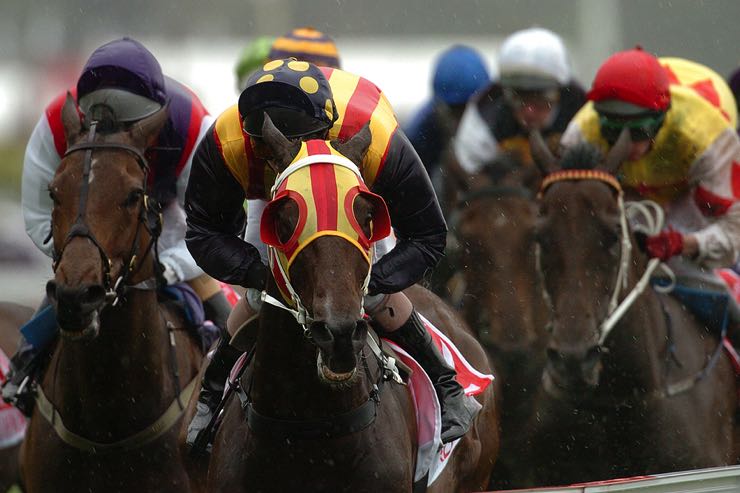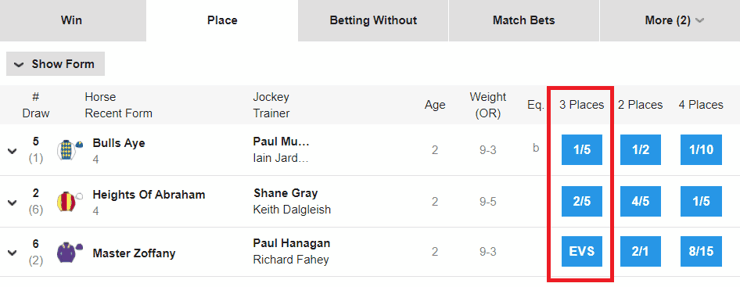
One of the most common types of bet, particularly in horse racing, is the each way bet – where you’ll receive a payout even if your chosen horse doesn’t win the race. So, if you were wondering what the difference is between each way and place betting, and when you should and shouldn’t place these kinds of bets, you’ve come to the right place – read on for the full lowdown.
Each Way Betting

Each way betting originates from the world or horse racing, and it is also racing that it’s most commonly used on. However, it is also very widely used in other sports and allows punters to hedge their bets somewhat by offering a form of insurance if the selection does well but doesn’t quite win.
What is an Each Way Bet?
An each way bet is effectively two bets in one, with half the bet going on the selection to win and half on it to “place” with the definition of “place” depending on the type of race and number of horses. For other sports it will vary depending on the relevant betting rules. With the bet being two-in-one, a £5 each way bet will cost £10, with a fiver on the win and the same on the place.
If the bet wins then both bets pay out as winners, if it places you lose the win portion but collect on the place half, whilst if it loses – doesn’t place – you lose both bets. In horse racing it is common to receive ¼ of the odds for a top three finish on the each way part of the bet, although it may be ¼ for just first and second, or a fifth for the top three, whilst on some major events bookies have been known to pay each way right down to six or even seven places!
Example
Lets say you place a £5 each way bet on a horse to win at odds of 8/1. This would cost you £10, made up of a £5 place bet and a £5 win bet. The each way terms for the race are 1/4 odds for 1-2-3-4. Below you’ll find what you’d get back depending on where your horse finished in the race:
- First Place – Here both bets win meaning you would receive £5 @ 8/1 for the win bet and £5 @ 2/1 for the place bet. Your total return would be £45 + £15 = £60, for a net win of £50.
- Second to Fourth Place – In this scenario only your place bet wins, meaning you would receive £5 @ 2/1. This would pay out £15, including the stake, for a total net win on the bet of £5 (assuming you take into account the losing win bet).
- Fifth Place or higher – If your horse finishes outside the places you receive nothing as both bets have lost.
EW Terms
The each way terms are usually made clear when you place your bets and in most circustances are listed on the racecard – marked as ‘EW’ or ‘Each Way’. There are two parts that you’ll need to pay attention to. First is the odds you’ll receive on a winning bet, such as 1/4 or 1/5. The second is the number of places which the bet pays to, such as 1-2-3 or simply ‘6 places’.
Below you’ll find an example from a real racecard which states each way terms of 1/5 odds for the first three places (1, 2 and 3):

Some betting sites may choose not to list each way terms unles they deviate from their standards, but these are in the minority and most will have the information somewhere on the page. If in doubt, check the bookies’ terms and conditions to be sure.
In other sports, such as tennis, or football cup competitions, each way bets usually refer to a player or team making the final, whilst in golf, with the huge fields often over 100 players, bookies will sometimes pay each way bets down to as many as the top eight!
Place Betting

A place bet is a single bet on the selection to, would you believe, “place”, as determined by the conditions relating to that race or event. There is no bonus or extra payout if the selection wins – you will receive the same amount if your horse finishes fourth (if that is in the defined places) as you will if it wins. The odds are naturally much lower for this outcome than for the selection to win and this generally relates to racing events only, with similar bets in other sports such as “To make the final” in football or tennis or a “Podium Finish” in Formula 1.
Some bookmakers also allow you to vary the number of places that your bet will pay out to whilst also appropriately increasing or decreasing the odds. In the screenshot about the first column shows the odds for the normal number of places – in this case three – whilst there are also options to remove or add a place depending on how confident you are that they’ll finish in the top few.
Example
Lets continue the example from earlier but apply it to a place bet rather than an each way bet – so you’re now just betting £5 for a horse to place. To make comparison easier we’ll use the same place terms as before – so 1/4 odds for 1-2-3-4. Here’s what happens depending on where your horse finishes.
- First Place – Here your place bet wins, meaning you’ll receive £5 @ 2/1 for a total return of £15 and a net win of £10.
- Second to Fourth Place – Exactly the same as first place. So £5 @ 2/1 for £15 back and £10 net win.
- Fifth Place or Higher – And finally your bet loses, meaning you win nothing.
How to Bet on Place Markets
Generally speaking making a place bet is simple and done in the same way as any other bet. Find the correct market, add it to your slip and choose your stake. Recently, however, some bookies have been burying their place betting markets (or even getting rid of them completely on smaller races) to encourage betting on the Each Way market instead. Bet365 in particular don’t seem to offer stand alone place bets on smaller races any more.
You may also find that the bookies use different names for a place bet. We’ve seen alternative terms like Top 3 Finish and Win or Each Way at various bookies, but they all mean the same thing – you’re betting on the horse to place.
When to Use Each Way and Place Bets
Because these bets offer a reduced payout compared to a straight win bet and are, in a sense, insurance or hedge bets, they tend to be used on outsiders. Whilst you can place an each way bet on a strong favourite it is uncommon because, depending on the odds, you may still lose money if it places but doesn’t win.
If you look at the table below you’ll notice that each way bets with odds of less than 4/1 will result in a net loss if the win portion of the bet loses, even if the place portion of the bet goes on to win.
| Odds | Win Returns | Net Win | Place Returns | Place Net Win |
|---|---|---|---|---|
| Evens | £16.25 | £6.25 | £6.25 | -£3.75 |
| 2/1 | £22.50 | £12.50 | £7.50 | -£2.50 |
| 3/1 | £28.75 | £18.75 | £8.75 | -£1.25 |
| 4/1 | £35.00 | £25.00 | £10.00 | £0.00 |
| 5/1 | £41.25 | £31.25 | £11.25 | £1.25 |
| 6/1 | £47.50 | £37.50 | £12.50 | £2.50 |
| 7/1 | £53.75 | £43.75 | £13.75 | £3.75 |
| 8/1 | £60.00 | £50.00 | £15.00 | £5.00 |
| 9/1 | £66.25 | £56.25 | £16.25 | £6.25 |
| 10/1 | £72.50 | £62.50 | £17.50 | £7.50 |
| 20/1 | £135.00 | £125.00 | £30.00 | £20.00 |
In sports such as tennis, snooker or darts an each way bet can be a great option when a player has a good draw and has a strong chance of making the final, even if you doubt they could go on and win. If the odds are sufficiently large that them making the final will return a decent net win, the win portion of the bet can often be seen as an unlikely but welcome bonus if it comes in.
In golf they are a major part of betting due the huge number of entrants and the associated difficulty in picking the winner. Each way shots at 50/1, 100/1 or even higher can quite often deliver stunning returns in golf, especially if you play at a bookie offering enhanced terms, such as the top five players or more.
In racing they are again generally used on outsiders, horses that you don’t expect to win but suspect could nick a place at long odds. Alternatively they can be used as insurance bets on favourites that you can’t see not placing. Where the win yields a handsome net win but the place would still cover your outlay, or perhaps leave a small win, these can be great bets.
Each way and place bets are a valuable part of any gambler’s armoury and knowing how they work and how to use them can be crucial to make a well informed bet.